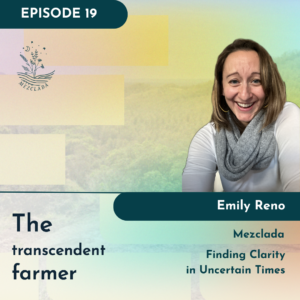Farming is one of the most stressful industries out there. There’s a reason why the rate of suicide among farmers is so high. I didn’t realize how bad it was until I conducted an interview with Emily Krekelberg as part of The Transcendent Farmer podcast in 2023.
I believe it’s important for people to be equipped with tools for stress management, and more than anything, prevention. This post is geared towards folks who are working in the farming industry, but regardless of whether or not you find yourself working the fields, feel free to take a look at these strategies and share with a friend who could benefit from the information.
- Take 5 seconds for yourself
Have you heard of The 5 Second Rule? Mel Robbins became famous for her book on this concept. I think I came across it through YouTube. You can find a ton of interviews where she talks about the rule and how it changed her life, from being stressed out and unproductive to really shifting to a more positive mindset and getting sh*t done.
Mel is one of the best public speakers out there, so definitely listen to some of her content and I promise, you won’t be disappointed.
- Cultivate a meditation practice
There’s so much research out there that illustrates the impact of meditation. I didn’t really get exposed to meditation until I started attending yoga classes at different gyms, and also didn’t have a very consistent practice until I completed my yoga teacher training in Rishikesh, India in December 2023.
I’ll never forget traveling to Australia after the training and feeling so grounded taking 30 to 45 minutes to meditate. And because I had already worked up to that time, it passed so quickly.
Today, almost 11 months after my training, I sometimes struggle to get through 15 minutes. I guarantee that even if you start with just 5 minutes a day, you’ll start to notice a difference in your stream of consciousness – that is, the negative thoughts around your to-do list, family, things that might be causing you stress.
There’s this saying that we don’t have control over what happens in our lives, but we do have control over how we react to it. This is where developing a meditation practice can really come in handy. Because suddenly you start to realize that the reactions and behaviors of other people have nothing to do with you – and in fact, it may be something completely unrelated to your personal relationship with the person that is causing them stress.
I try to remind myself often that we never know what’s going on in someone’s lives, and that we shouldn’t be so quick to jump to judgement. This has proven helpful over and over again.
So you’re probably thinking to yourself, where do I start?
Honestly, guided meditations are probably the best, as having your own independent practice can be quite challenging and your ability to focus your attention requires certain tools, such as mantras.
You can find guided meditations through your local library as audiobooks or CDs, YouTube, and apps (both free and paid). Depending on the size of the city you live in, you may even have access to a meditation center. Search for something like “guided meditation 15 minutes” and then you can even add keywords like “to start the day” or “for sleep” or “for relaxation” or “for reducing stress” and I’m sure you’ll be pleasantly surprised by what you find.
One of my favorite YouTube channels for existing videos is called Great Meditations. The voice of the girl who guides you is lovely! You can also find guided meditations in different languages.
- Fill your body with fresh, healthy foods
I had a great conversation with my sister through The Transcendent Farmer podcast earlier this year, and one of the things we talked about was this idea of big companies controlling the population through food. Basically by feeding people unhealthy food that’s addictive, you keep them in a trap of feeling bad and seeking these highly processed, high-calorie foods that don’t actually give them the energy they need to think clearly.
I think there’s a big movement right now in the food industry to move towards what are known as ‘functional foods’. AKA different beverages, snacks, and supplements that are designed to ‘optimize human performance’. For example, the advent of SALTY, an electrolyte drink that’s designed to maintain people’s salt levels in their body, instead of just focusing on drinking a ton of water.
I also hear a ton of ads for things like powders that get mixed into your water in the morning to give you different minerals and vitamins that your body may be missing in its regular diet.
The point here is that there is a direct correlation between what you put in your body and your mood. I know this from having done a ton of bullet journaling and noticing a pretty big difference between when I eat lots of salads and fresh foods and keep up my hydration levels in comparison to when I’m eating a lot more heavy items or even eating out at restaurants a lot.
Eating is a social activity, so try to communicate with those around you who you dine with regularly what your goals are to make it easier for them to support you. Otherwise, you may be the center of attention for your ‘abnormal’ dietary choices. I have been on the other side of being made fun of for not eating certain items, so I know what it’s like to feel bullied. Keep focused on your goals and don’t be afraid to change up who you eat with!
- Build your team of financial advisors and cheerleaders
One of the themes that I’ve noticed over and over again having worked with a ton of farmers over the years is that there is a direct correlation between one’s level of financial stability and their stress levels.
What does this mean in terms of how you can take responsibility – and a preventative approach – towards getting yourself in a good head space? Building your financial team.
I have a Google doc somewhere in the cloud that has a list of people who support me with my finances and goal-setting. Sometimes I touch base with these folks on a regular basis, sometimes less frequently, but regardless, I know that they’re all in my corner, working to help me achieve my goals.
Here are some examples of the kinds of people that can support you in reaching your financial goals and what their role could look like:
- Financial Advisor
A professional who helps you create a comprehensive financial plan tailored to your farming operation. They can assist with investment strategies, retirement planning, and navigating economic uncertainties unique to agriculture. These are often associated with existing programs that you have to manage investment accounts – don’t be afraid to look at different options for who could manage these funds, and talk to people about diversifying your portfolio beyond just stocks and bonds. There’s so much more out there that can produce a return on investment that you probably haven’t even considered! - Accountant or Bookkeeper
This person ensures your financial records are accurate and up-to-date. They help with tax preparation, expense tracking, and maintaining compliance with financial regulations, allowing you to focus on farming. Don’t be afraid to shop around when it comes to this or to change your CPA or accountant from one year to the next until you’re satisfied. I currently have a CPA in the U.S. and an accountant based in Costa Rica. 🙂 I’ll be hiring a new CPA in 2024. - Farm Business Consultant
Specializing in the agriculture industry, they can provide insights into farm profitability, business expansion, and market trends. They’re also helpful in identifying grant opportunities or cost-saving measures. I currently offer services in this arena because I’ve found that having that 1:1 support can be invaluable! - Mentor or Experienced Farmer
A trusted peer or mentor with years of farming experience can provide guidance on financial decision-making. They offer perspective on challenges you might face and share strategies they’ve used to stay financially stable. This could be someone you identify locally, through a farmer-based nonprofit organization, or virtually through a national or international network. - Supportive Friend or Partner
This is someone you trust who understands your goals and is invested in your success. While they may not be a financial expert, their encouragement and accountability can keep you motivated as you work toward financial stability. I have people who regularly check in with me and talk about both personal and business finances. - Financial Coach – A financial coach works with you to build healthy financial habits and set realistic, actionable goals. They help you create budgets, manage debt, and develop strategies for improving cash flow, focusing on education and empowerment rather than financial products. Seriously one of the best investments I made in myself back in 2022!
One of the projects that I worked on a couple of years ago to help me reach my financial goals was a 60-day financial fitness challenge, essentially with the goal of getting to a point where I didn’t have to take on a part-time job in addition to my consulting work. The idea was also to help people get on a stronger financial footing so that they could position themselves to one day purchase property of their own, or an existing farm business. You can read more about it on the blog.
I’m hopeful that these strategies provide some insight into options that you have to build up your own support network and ability to manage daily stresses with a bit more ease.




